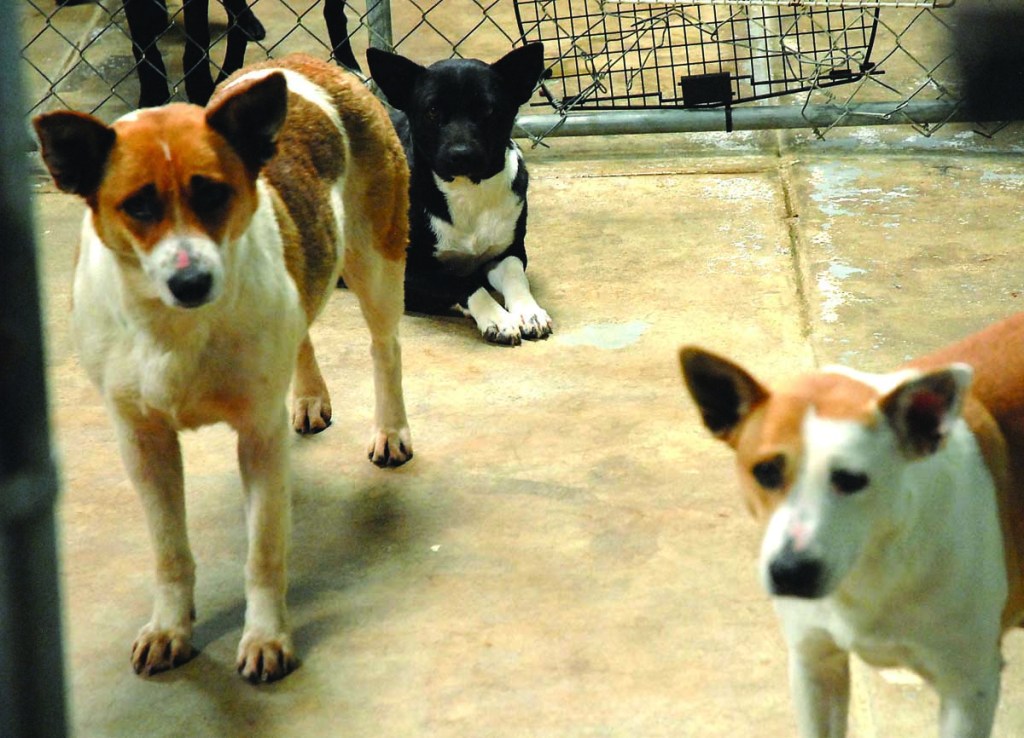Hopes running high for changes at Humane Society
Published 1:55 pm Wednesday, May 1, 2019

- Twenty-seven dogs were collected last week from a single location. These three females are among the half of those who remained at the Humane Society of Moultrie-Colquitt County on Thursday. No-kill facilities took nearly 100 dogs from the facility in recent days but it remained at capacity as the usual springtime influx of animals continues.
MOULTRIE, Ga. — Supporters of reorganizing Colquitt County’s animal shelter hope the change will reduce the number of animals coming in and ultimately the number that have to be housed or euthanized.
Despite assistance from no-kill organizations who have been accepting a large number of dogs from the Humane Society of Moultrie-Colquitt County, the facility is constantly at its capacity of 125 dogs and cats. In one case last week shelter personnel took in 21 dogs from a single location, and one of those gave birth to six puppies a short time after arriving.
The organization is adding 12 outdoor kennels to increase the number of dogs it can house, but officials say that addresses only part of the problem.
It is not a solution to the seemingly ever-increasing numbers coming in. That will require a reduction on the supply side of the equation, which is increased by boy and girl animals doing what comes naturally.
“I hope that the city and the county can provide some ordinances in the future that will reduce the number of unwanted pets,” Moultrie City Manager Pete Dillard said during a telephone interview. “The problem is kittens running loose, dogs running loose” that are not spayed or neutered.
Moultrie City Council and Colquitt County Commission have agreed to get more involved in the issue. The governments will pick a new seven-member Humane Society board, which will begin running the organization on July 1.
The county also plans to increase its funding by about $20,000 per year to $100,000, the same amount as the city’s contribution.
Representatives from the shelter approached county commissioners earlier this month, requesting an additional $20,000 from the county, which would bring its contribution to $120,000 for the 2019-2020 budget year if approved. They plan to make the same pitch to Moultrie council members.
Humane Society representatives told commissioners on Tuesday that one goal is to hire additional workers. Because the animal shelter is short-staffed workers who put in a full day caring for animals and making pickups also are on call at night. In some cases employees are putting in 30 hours or more of overtime in a two-week pay period, a Humane Society official said.
Alicia Land, Humane Society board president, said a new board will be able to apply for grants for spay-and-neuter programs and neuter-and-release for feral cats. Both of those would go a long way toward addressing the numbers issue at the Humane Society facility.
The current board has had issues keeping in place a president, vice president and treasurer, which is a requirement for applying for grants.
“With a full staff we can go into the school system, we can go into different places and educate the public,” Land said during an interview following the presentation to commission members. “(Not) spaying and neutering is such a big problem. It’s the most serious problem.”
Land described the shelter as a “low-kill” facility, but the goal is to make it one where no adoptable animals are killed.
“The main problem with the overflow at the shelter, if we can’t adopt them out, the only alternative is euthanasia,” she said. “We work with these animals. We try to rehabilitate every one of them we can.”
Moultrie and Colquitt County contract with the Humane Society to pick up nuisance, stray and dangerous dogs, a service to taxpayers.
However, Dillard said he and Colquitt County Administrator Chas Cannon thought a change in direction is needed. He and Cannon, who will be non-voting members of the new board, both said they will consider the extra $20,000 in funding requested when preparing budgets this year.
In addition to the extra money, Dillard thinks city and county involvement will bring other benefits.
“We feel like we can help with budgets, with organization, with policies to make the leadership more effective,” he said. “As a Humane Society it will continue doing the same things they’re doing now.
“Hopefully we can apply for a grant for trap, neuter, release. Over time that will eliminate the population of feral cats downtown.”





